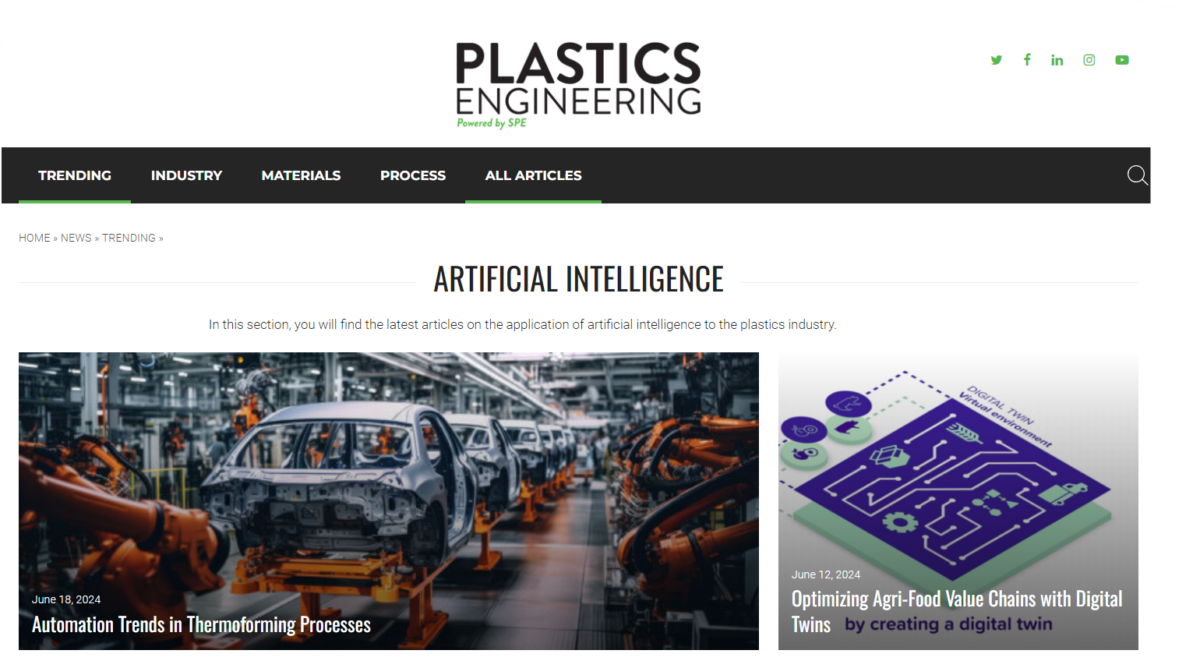Celebrating 1 Year of PE Going Digital

Plastics Engineering (PE) transitioned to a fully digital format in 2023, showcasing the publication’s flexibility and adaptability. Some contributors shared their thoughts about this milestone.
SPE is committed to staying ahead of industry trends. By going digital, readers can now access diverse articles anytime, anywhere. This accessibility, combined with SPE events and social media interaction, makes information more engaging and supports continuous learning and the career growth of plastics industry professionals.
You can also read: Industry 4.0 in Injection Molding
Here are some comments about this significant transformation as PE embraces the digital era.
I Want to Say One Word to You: Plastics

Juliana Montoya, Director of Content for Plastics Engineering.
Almost like a fortune teller, Fred O. Conley founded SPE in 1942. Much was happening around the industry without knowing the great takeoff it would have in the following years. It is no coincidence that in 1943, Dupont had a whole division working on prototypes of housewares, and in 1944, Plax Corp. distributed LDPE squeeze bottles, leading to the growth of the blow molding industry. But with SPE, Conley did something else…he produced a publication about plastics named The Commentator, which years later continues as we know it, “Plastics Engineering (PE).” Since the beginning of SPE, educating professionals in the industry has been a mission, and it still flows in the DNA of SPE and PE.
Something unique is that SPE has grown alongside the industry, and a lot has happened since then. The production of plastics has increased exponentially since 1950. This is why it’s not surprising to me that SPE is now 82 years old, representing a strong and growing industry. Since its early appearance with celluloid and Bakelite, plastic has shaped our society and democratized the ability to enjoy conveniences and the comfort of modern life. That’s precisely what plastic gave us: the opportunity to invent the modern aesthetic for everyday life. But this came with a price: the demonization of plastics.
You Cannot Live Without Plastics
As Susan Frenkel said, plastic is a material with which we’ve had a toxic relationship. It is the material we love to hate but can’t seem to live without. In her book “Plastic: A Toxic Love Story,” she wrote down the plastic objects she used in her daily life and filled four pages of her notebook. She also noticed that she used twice as many plastic objects as non-plastic ones. This is a powerful conclusion for every person who dares to do the exercise: whether it is love or hate, you cannot live without it.
Plastic gave us a universal state of democratic luxury. That’s why 97% of North Americans have cell phones made of plastic. And 91% of households in the US have at least one vehicle, whose production heavily relies on plastics.
For 81 years, Plastics Engineering print magazine kept informing professionals about technological trends and innovations in the sector, alongside SPE and industry development. In 2023, the print magazine went fully digital, representing many things. First, a technical voice is needed regarding plastics, and being digital allows the publication to impact more people and educate engineers and the general public. Moreover, there is a crucial topic around plastics that we as a society must address: sustainability. There is so much to do about it, and we are at the tip of the iceberg.
As plastics have democratized luxury and comfort in modern life, the digital era means the democratization of information, and Plastics Engineering has the mission to continue educating people about plastic.
There is a famous scene from the 1968 movie ‘The Graduate’ when Ben thinks about his future career, and an older man says, “I just want to say one word to you: Plastics.” I find this as relevant now as it was in 1968. That’s why we needed PE to go digital.
Juliana Montoya, Director of Content for Plastics Engineering.
Embracing the Digital Transformation

Ryan Foster, SPE Marketing Projects Manager.
Being part of the evolution of Plastics Engineering magazine has been an honor. From the 2021 award-winning redesign to the digital launch, we have seen Plastics Engineering become a more and more important voice in the plastics industry. The launch of the fully digital publication one year ago has made it easier than ever to get relevant information to people more timely and enabled them to use and share the information directly from any device. As the publication grows and changes, I’m excited to see where we can take it in the coming year.
Ryan Foster, SPE Marketing Projects Manager. He was the Art Director for Plastics Engineering Print Magazine Since 2016. Under his direction, Plastics Engineering won the TRENDY award for Most Improved Magazine or Journal in 2022.
A Long History of Serving the Industry

Robert Grace. Freelance Journalist contributing to Plastics Engineering since 2015.
Roughly seven years ago I got a healthy dose of old-style publishing when I was researching SPE’s archives for a 75th anniversary edition of Plastics Engineering. I spent a couple of days in SPE’s then-HQ in Bethel, Conn., sifting through dozens of bound volumes and dusty files for what would become a 94-page special edition of the July/August 2017 issue of PE. One observation I made was that SPE’s leaders –– even in the middle of the last century –– attached tremendous value to the society’s journals, newsletters, and magazines.
The group changed the name of the publication to Plastics Engineering in 1973, and so it remains today –– 51 years later. The most significant transition, reflective of trade publishing trends, occurred in July 2023, when SPE shuttered the print edition for good, opting instead for the current digital portal at PlasticsEngineering.org. The delivery mechanism has changed, but the mission remains the same –– to deliver timely and relevant news and information about the most significant engineering and technical developments in the plastics industry.
And so we mark 82 years of Plastics Engineering and a full year now of PE’s new digital version. Here’s to the endurance of reporting and journalism and the continued education of the plastics industry.
Robert Grace is the former founding editor of Plastics News, which he headed for 25 years. He has run his own editorial business, RC Grace LLC, since 2014 and has been a freelance journalist contributing to Plastics Engineering since 2015.
PE- A Voice for The Plastics Industry

Geoff Giordano has more than 30 years of experience in content strategy, news production and tech journalism.
It was a pleasant surprise when Plastics Engineering began publishing as a digital-only product. To be sure, print isn’t dead. However, a new delivery system for PE seemed more optimal to serve a new audience and better understand its needs. No matter what form it takes, Plastics Engineering must remain an authoritative voice for the plastics industry. It’s always been a pleasure contributing to that mission.
Geoff Giordano has more than 30 years of experience in content strategy, news production and tech journalism. He has worked as freelance journalist for Plastics Engineering since 2010.
We invite you to visit the archive of Plastics Engineering print magazine HERE
